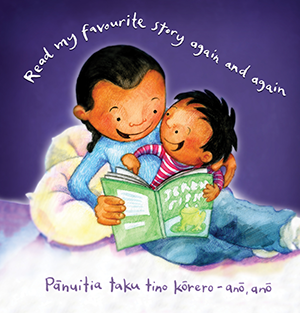
Book sharing with toddlers
Making book sharing part of a toddler's day builds attachment, grows their vocabulary, and helps them make sense of the world. Reading to a toddler each day helps them participate and makes it a fun thing to do.
When tamariki have positive experiences with books, they develop good feelings about reading and are motivated to continue seeking out books and stories as they grow.
Toddlers enjoy regularly sharing books. You'll probably find they pick up books independently, especially familiar books, when book sharing is a regular part of their life.
Because toddlers are more able to follow a story now, sharing books is a more interactive experience. You can use paper books with them too because they’re less interested in mouthing now. But you might need to keep an eye on them if you're using precious or borrowed books because for many toddlers the urge to rip paper is irresistible!
The benefits of sharing books
One-on-one time sharing a book with an adult is a great way to strengthen many areas of a toddler’s development. Here are 3 key benefits.
Sharing books builds attachment
The most important thing about sharing books with children at this stage is the enjoyment it creates. The chance to have time together strengthens relationships between them and their parents and whānau. Reading together promotes closeness and connection.
Toddlers like predictability and participation. Sharing a book is a way for a toddler to participate in something meaningful with an adult, and it helps them to feel a sense of acceptance and inclusion.
Many toddlers have a favourite book or story and enjoy sharing it over and over again. Yes, this can feel very repetitive for parents! That said, there is real value for their toddler in revisiting the same book over and over because it provides predictability (the print is consistent, the same story happens no matter who reads it). It's comforting to snuggle up and indulge in the repeated sharing of a favourite book, especially if the young child lives in a stressful environment. Sharing books creates a bond that increases children’s cognitive and social-emotional development and helps them feel loved.
Sharing books enhances their vocabulary
Books often use language that is richer and more varied than normal conversation. You often find other languages in books too, such as te reo Māori. Discovering these fun and interesting words and languages in a book is an enjoyable way to extend a child’s vocabulary. And remember, books don’t have to be read word-for-word. Talking about the pages or telling a story to go with the pictures can be really fun and interesting too. For parents who may lack confidence in their own reading skills, this can be a good way to access the benefits of sharing a book.
You'll help them develop pre-reading skills as well. Not only do toddlers increase their vocabulary, they also learn about books – things like: they have a front and back, a right way up, they have pictures and words, and the words are read from left to right. They learn that words are made up of different sounds and that stories have a beginning, middle and end.
Sharing books helps them make sense of the world
Life is full of changes, and books provide us with a way to think and talk about them from a ‘safe distance’, especially scary or upsetting things. What can be scary or upsetting? Well, anything from moving to a big bed, a new home, having a new sibling, going to ECE, or losing a beloved person or a pet. Sharing a picture book helps – in the story, another child is learning to deal with the issue. The parent and child get to snuggle up together and think about the problem from a position of safety and security.
Book sharing helps the child learn about their world and understand that people have different viewpoints. This is an early stage in the development of empathy.
Try an activity
‘I can’ book – He pukapuka ‘Ka taea e au’
Making a scrapbook helps tamariki to explore the magic of books and storytelling. Paper, a stapler, a glue stick and some pictures of the toddler are the resources required for this activity.
How to make book sharing part of a toddler’s day
Many toddlers want to choose the book themselves. Encourage this. Let them lead and go at their pace. Let them turn the pages while you talk about things the child notices or points at. These are all simple ways to increase a toddler’s feelings of independence and encourage their growing self-confidence.
Join a local library. This will provide regular access to a wide range of books and puzzles. Many libraries run story times for pre-schoolers. Get to know local librarians, as they can be an excellent resource.
Look for moments to read together often – book reading and stories can happen at any time throughout the day, not just at bedtime. The more that books are part of their everyday lives, the more toddlers will see reading as a pleasure and a gift.
Make a homemade book about 'me' (the child). They can be personalised very easily or ‘themed’ around things the toddler likes or is interested in. Topics like ‘When Nana came to stay’ or 'A visit to the playground' can work well. If you can, include some photos of the child so they can see themselves in the story.












